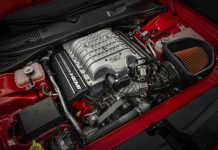Here’s the latest reader question, along with my reply!
John asks: What’s the best modern car that’s untrackable and cannot be manipulated via an onboard Onstar or equivalent system? Is there a place where you recommend these?
My reply: Let’s begin by defining “modern” cars.
In my opinion, a “modern” car is one that has an electronically (not mechanically) fuel-injected engine and an overdrive transmission – as these two things are, arguably, what make a car drive “modern.” Defined as: Easy/immediate starting in all weather; smooth/reliable running (doesn’t stall or bog under acceleration) with the ability to maintain today’s highway speeds of 75-80 comfortably (i.e., engine not screaming at 70 percent of redline).
This would encompass all cars made since the early 1990s. From then until about the early-mid 2000s, cars reached the apotheosis of functional design. There has been very little meaningful improvement since then, just increased complexity – and, of course, Big Brotherism.
Compare, for instance, a circa 1995 Corolla with a brand-new one. What has the new one got that the old hasn’t got? Well, the new one has more electronic gadgets – most notably an LCD touchscreen and a better stereo. It will also have some additional power options, such as windows and locks and cruise control – while the ’95 will likely have manual windows and no cruise control.
But how about what makes them go?
The ’95 has a 1.6 liter, four cylinder engine with electronic fuel injection paired with either a four-speed automatic overdrive transmission or a five-speed manual transmission (also overdrive). This car was rated 28 city, 38 highway.
The new one has a 1.8 liter four cylinder engine paired with either a six-speed manual overdrive transmission or a continuously variable (CVT) automatic. Despite almost 25 years of “advances,” the new Corolla gets essentially the same mileage (30 city, 38 highway) and doesn’t start/run or drive meaningfully better than the ’95 model.
The new cart is slightly more powerful – 139 hp vs. 105 hp – but that advantage is mitigated by the new car’s higher curb weight.
Sure, the new car is quieter and more luxurious feeling. But is it meaningfully better in terms of its ability to transport you from A to B reliably and efficiently?
Not that I can tell.
This is true generally of the cars made circa early-mid ’90s through the early-mid 2000s. The only obvious deficits are – as mentioned – the audio systems (which can be easily upgraded) and the lighting systems (which can also be upgraded).
But these cars won’t have the “upgrades” you can I and a growing number of people want no part of. These cars will have ABS and a basic traction control system, in most cases – but both can be easily turned off/defeated if you prefer not to have them. And there won’t be any “assistance” technology and minimal Big Brother technology – the latter much more easily defeated if it is there.
If the car has OnStar or similar, it can be disabled by disconnecting the antenna.
What you want to avoid is a car that has WiFi capability/GPS integrated with the car’s ECU – the computer that controls the car’s operation. Also, drive-by-wire throttle control.
Pre-2000 cars won’t have these things and many cars made for a few years after 2000 were also free of these things. By 2010 or so, most cars came with some or all of these things.
PS: You can make a ’60s or ’70s car drive like a “modern” car with a few relatively inexpensive upgrades and avoid everything – including air bags and ABS!
. . .
Got a question about cars, Libertarian politics – or anything else? Click on the “ask Eric” link and send ’em in!
If you like what you’ve found here please consider supporting EPautos.
We depend on you to keep the wheels turning!
Our donate button is here.
If you prefer not to use PayPal, our mailing address is:
EPautos
721 Hummingbird Lane SE
Copper Hill, VA 24079
PS: Get an EPautos magnet (pictured below) in return for a $20 or more one-time donation or a $10 or more monthly recurring donation. (Please be sure to tell us you want a sticker – and also, provide an address, so we know where to mail the thing!)
My latest eBook is also available for your favorite price – free! Click here. If that fails, email me and I will send you a copy directly!











I suppose that my 1989 pickup is easily trackable by the peeling paint, spray can grey primer on the hood and cab roof, cracked grill, mud splatters, and spare tire and hi-lift jack mounted in the bed right behind the cab.
LOL I doubt anyone will steal it.
Recently I got a “nasty-gram” from the City of Citrus Heights about WHY didn’t I have my license plates on my brand new ride (like, I hadn’t yet GOT them from DMV?). Evidently whomever contracts with them for their “red-light cameras” has imaging software that reads and ferrets out the license plate and identifies the owner..and if the picture of the driver doesn’t jibe with the registered owner, they inquire as to WHO is driving (hint: you can tell them to go ‘pound sand’) since CA tickets the DRIVER and not the OWNER. Anyway, the City wasn’t trying to charge me with any moving violation (unless the picture, which shows me proceeding through the intersection of Oak Avenue and Sunrise Blvd on a GREEN light, indicates a NEW VC violation of ‘running a green’), they just wanted to know WHY I had the dealer’s “paper plates”. I simply ignored it.
Even a Model T is trackable if you carry a cell phone.
All cars in the US are easily tracked by license plate. Every highway is bristling with cameras, ostensibly for saaaaaaaaaaety, but those video feeds can easily feed to plate reader software. Even if they don’t, the AGW vehicles, bounty hunter’s vehicles, repo-men’s vehicles, and pretty soon Ring doorbell cameras will be tracking license plates.
Toll booths don’t need you to pay, nor do they need the transponders; they snap a pic of your plate, then send you the bill. FL was doing this 2 years ago when I was down there…
Hello MM, our toll roads here in Smellbourne, due to the smelly third world barbarians we import to create terror situations, we had this tech back in the mid 90s. Looks like the US is behind the times when it comes to tracking cars.
I’d say that that’s a GOOD thing!